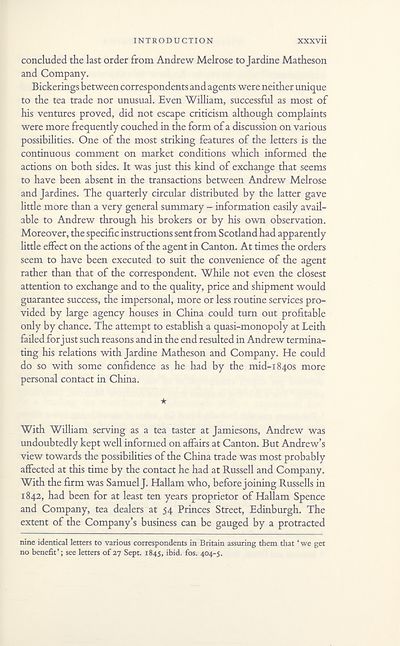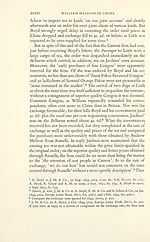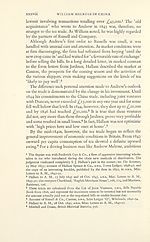Series 4 > William Melrose in China, 1845-1855
(42) Page xxxvii
Download files
Complete book:
Individual page:
Thumbnail gallery: Grid view | List view

INTRODUCTION
XXXV11
concluded the last order from Andrew Melrose to Jardine Matheson
and Company.
Bickerings between correspondents and agents were neither unique
to the tea trade nor unusual. Even William, successful as most of
his ventures proved, did not escape criticism although complaints
were more frequently couched in the form of a discussion on various
possibilities. One of the most striking features of the letters is the
continuous comment on market conditions which informed the
actions on both sides. It was just this kind of exchange that seems
to have been absent in the transactions between Andrew Melrose
and Jardines. The quarterly circular distributed by the latter gave
little more than a very general summary - information easily avail¬
able to Andrew through his brokers or by his own observation.
Moreover, the specific instructions sent from Scotland had apparently
little effect on the actions of the agent in Canton. At times the orders
seem to have been executed to suit the convenience of the agent
rather than that of the correspondent. While not even the closest
attention to exchange and to the quality, price and shipment would
guarantee success, the impersonal, more or less routine services pro¬
vided by large agency houses in China could turn out profitable
only by chance. The attempt to establish a quasi-monopoly at Leith
failed for just such reasons and in the end resulted in Andrew termina¬
ting his relations with Jardine Matheson and Company. He could
do so with some confidence as he had by the mid-i840s more
personal contact in China.
With William serving as a tea taster at Jamiesons, Andrew was
undoubtedly kept well informed on affairs at Canton. But Andrew’s
view towards the possibilities of the China trade was most probably
affected at this time by the contact he had at Russell and Company.
With the firm was Samuel J. Hallam who, before joining Russells in
1842, had been for at least ten years proprietor of Hallam Spence
and Company, tea dealers at 54 Princes Street, Edinburgh. The
extent of the Company’s business can be gauged by a protracted
nine identical letters to various correspondents in Britain assuring them that ‘ we get
no benefit’; see letters of 27 Sept. 1845, ibid. fos. 404-5.
XXXV11
concluded the last order from Andrew Melrose to Jardine Matheson
and Company.
Bickerings between correspondents and agents were neither unique
to the tea trade nor unusual. Even William, successful as most of
his ventures proved, did not escape criticism although complaints
were more frequently couched in the form of a discussion on various
possibilities. One of the most striking features of the letters is the
continuous comment on market conditions which informed the
actions on both sides. It was just this kind of exchange that seems
to have been absent in the transactions between Andrew Melrose
and Jardines. The quarterly circular distributed by the latter gave
little more than a very general summary - information easily avail¬
able to Andrew through his brokers or by his own observation.
Moreover, the specific instructions sent from Scotland had apparently
little effect on the actions of the agent in Canton. At times the orders
seem to have been executed to suit the convenience of the agent
rather than that of the correspondent. While not even the closest
attention to exchange and to the quality, price and shipment would
guarantee success, the impersonal, more or less routine services pro¬
vided by large agency houses in China could turn out profitable
only by chance. The attempt to establish a quasi-monopoly at Leith
failed for just such reasons and in the end resulted in Andrew termina¬
ting his relations with Jardine Matheson and Company. He could
do so with some confidence as he had by the mid-i840s more
personal contact in China.
With William serving as a tea taster at Jamiesons, Andrew was
undoubtedly kept well informed on affairs at Canton. But Andrew’s
view towards the possibilities of the China trade was most probably
affected at this time by the contact he had at Russell and Company.
With the firm was Samuel J. Hallam who, before joining Russells in
1842, had been for at least ten years proprietor of Hallam Spence
and Company, tea dealers at 54 Princes Street, Edinburgh. The
extent of the Company’s business can be gauged by a protracted
nine identical letters to various correspondents in Britain assuring them that ‘ we get
no benefit’; see letters of 27 Sept. 1845, ibid. fos. 404-5.
Set display mode to:
![]() Universal Viewer |
Universal Viewer | ![]() Mirador |
Large image | Transcription
Mirador |
Large image | Transcription
Images and transcriptions on this page, including medium image downloads, may be used under the Creative Commons Attribution 4.0 International Licence unless otherwise stated. ![]()
| Scottish History Society volumes > Series 4 > William Melrose in China, 1845-1855 > (42) Page xxxvii |
|---|
| Permanent URL | https://digital.nls.uk/127695081 |
|---|
| Description | Over 180 volumes, published by the Scottish History Society, containing original sources on Scotland's history and people. With a wide range of subjects, the books collectively cover all periods from the 12th to 20th centuries, and reflect changing trends in Scottish history. Sources are accompanied by scholarly interpretation, references and bibliographies. Volumes are usually published annually, and more digitised volumes will be added as they become available. |
|---|


